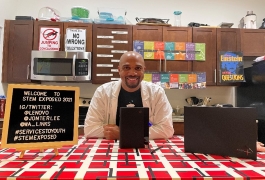How To Blaze Your Own Trail in Pharmacology
Early in elementary school, Namandjé Bumpus spent many happy hours experimenting with chemistry sets. She liked how mixing chemicals together could make things happen, such as changes in color or temperature, or even small eruptions of liquid. But she knew little about what real chemists do. So she wrote to the American Chemical Society to find out. In return, Bumpus received a packet of brochures describing the many roles that chemists play. She was especially excited to learn about chemists involved in developing and producing fuels, foods, and medicine. As she grew older, Bumpus became interested in medicine, but she didn’t want to be a physician. “I really wanted to be a scientist and do the things I saw in those brochures,” says Bumpus.
Today, Bumpus is a pharmacologist at Johns Hopkins University School of Medicine. Pharmacology, she says, is a field of many diverse interests united by the common mission to understand how drugs work, make new medicines, and improve upon existing ones.
Preparing for a pharmacology career is not always straightforward; many colleges don’t offer pharmacology classes. But opportunities within pharmacology are many—from positions in academia and government to large pharmaceutical companies and startups. Read on to learn how you can blaze your own trail to an exciting career in pharmacology.
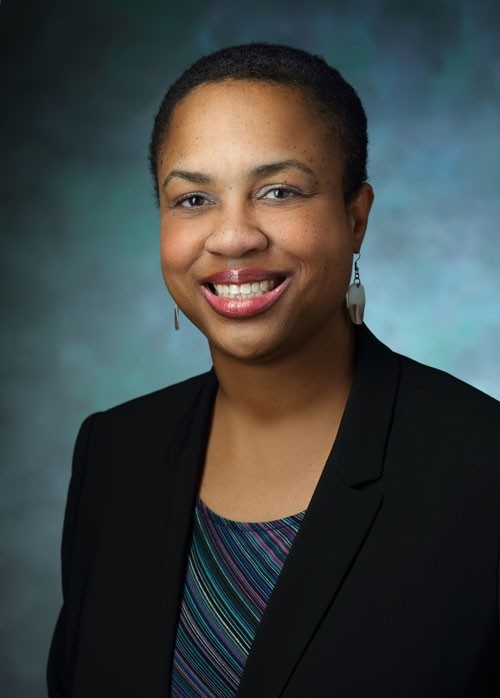
Pharmacologists at work
If you want to find the pharmacologists at your university, you may have to search broadly. That’s because pharmacologists practice within many departments, including chemistry, biology, genetics, and cancer research centers. At Hopkins, Bumpus is the director of the Department of Pharmacology and Molecular Sciences.
Regardless of the department, pharmacology is not pharmacy. According to the American Society for Pharmacology and Experimental Therapeutics (ASPET), the fields are often confused, but pharmacology is a branch of science focused on chemical properties in drugs and how they work in the body. Pharmacologists study how drugs affect our physical, emotional, and psychological well-being, how to administer drugs, and how they are absorbed by the body. Pharmacy is the practice of preparing and dispensing drugs. Pharmacists distribute prescription drugs to individuals and give advice to patients on how to take medications, correct dosages, and potential side effects.
Research within pharmacology varies widely—from translational research aimed at getting new drugs on the market fast to more basic science that explores how our bodies function in the hopes of revealing new drug targets.
Bumpus’s research focuses on how a family of enzymes known as cytochromes P450 metabolizes drugs in the body. Understanding this process is critical to designing effective and safe medications because P450s metabolize the majority of drugs that we take. In many cases, P450s transform drugs into metabolites that are harmless and can easily be excreted from the body. But in other cases, metabolites can be toxic. Your genes and diet can influence the number of drug-metabolizing enzymes you have in your body at any point, which in turn influences the levels of metabolites. That’s why acetaminophen labels say not to drink alcohol with the medication, explains Bumpus. “You end up with more and more of that toxic metabolite being formed because you have higher and higher levels of that P450.” Bumpus is specifically interested in understanding how toxic metabolites may contribute to acute liver failure in people taking certain HIV and hepatitis C treatments.
Carley Heck, who studied with Bumpus and received her PhD in pharmacology and molecular sciences from Hopkins in 2019, also explores drug metabolism, but from within industry. “My job is to figure out the structures of metabolites and what enzymes are responsible for generating these metabolites,” says Heck, who works at Pfizer in Groton, CT. Heck spends up to half of her time running experiments and much of the rest of the time analyzing data. “Since we’re figuring out chemical structures,” she says, “it is sort of like puzzle solving.”
At the Food and Drug Administration (FDA) in Silver Spring, MD, Michelle Walker practices regulatory pharmacology. Instead of working at the bench, she studies reports and academic literature to review the safety and efficacy of particular active ingredients in drugs for specific therapeutic purposes. She also reviews drug labels to determine whether medications are in compliance with FDA regulations. Walker works with over-the-counter drugs and finds satisfaction in seeing the medications that she’s helped to get approved on drugstore shelves. “It’s pretty cool that I’m involved in regulating products that are used by millions of people,” says Walker. “We play a big part in the public’s health.”
Raymond Mattingly, who recently started a new position as chair of the Pharmacology and Toxicology Department at East Carolina University’s Brody School of Medicine, has spent his career searching for novel ways to treat cancers. Traditionally, researchers screen cancer drug candidates using cell cultures grown flat on dishes. “Cells growing on a plastic dish are not really similar to a tumor growing in a person,” says Mattingly. His team is developing ways to grow multiple cell types in 3-D matrices. “The hypothesis is that if you do a drug screening on those, the hits you get are much more likely to translate successfully,” he says.
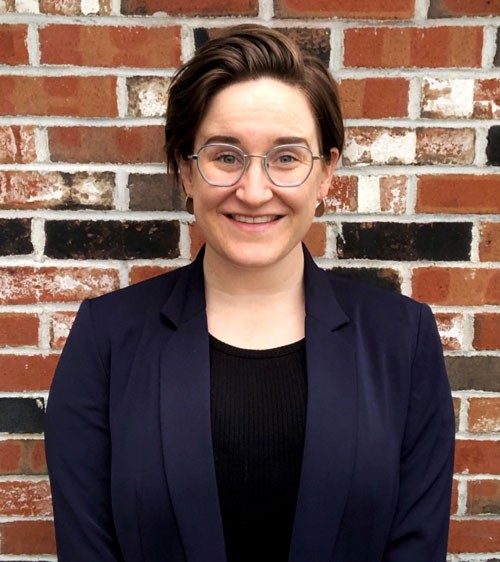
Putting pharmacology to the test
If you think pharmacology could be the right career for you, start exploring the field now by finding relevant courses, talking with pharmacologists about their career paths, and getting some hands-on experience. The challenge, says Bumpus, is that you may not have a pharmacology department, major, or even class at your school. “I think it is difficult at the undergraduate level to feel like you are getting direct exposure to pharmacology,” says Bumpus.
But the good news, she says, is that the study of pharmacology encompasses many disciplines. You can dive into key pharmacology concepts by taking classes in other departments like chemistry, biology, and physiology.
“Pharmacology is very interdisciplinary,” agrees Jessica Sawyer, an assistant research professor of pharmacology and cancer biology at Duke University, who advises undergraduate biology majors who are completing a pharmacology concentration. “Definitely you can have some people that are much more on the chemistry side, people that are more on the biology side, people that are more on the drug development side.”
Whatever courses you take, getting some hands-on research experience can help you decide if pharmacology is right for you. As an undergraduate, Bumpus didn’t take a single pharmacology course—her school didn’t offer any. But she completed a summer research program at the University of Michigan in the Department of Pharmacology where she studied G protein–coupled receptors, the targets of many drugs. “I thought, ‘This is for me. Pharmacology is what I want to do,’” she recalls.
You may also be able to find a research lab to call home at your own school. Favia Nixon, a fourth-year student at Wayne State University in Detroit, conducted research in Mattingly’s lab while he was chair of Wayne State’s Pharmacology Department. Nixon, a neuroscience major minoring in public health, tested how drugs impact cell growth and proliferation pathways in the hopes of identifying a better treatment for neurofibromatosis type 1 (NF1), a genetic condition that causes the formation of benign tumors along nerves, which can sometimes lead to cancer. She initially connected with Mattingly’s lab her first year, with support from the school’s Initiative for Maximizing Student Diversity program.
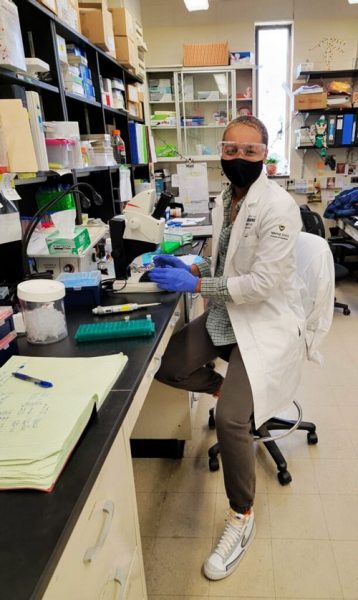
It may seem daunting to approach a professor and offer to help out in the lab, says Garrett Walker, a third-year pharmacology and toxicology major at the University of the Sciences in Philadelphia. “You may feel like, they wouldn’t want me in a lab. I don’t know anything yet.” But a reliable undergraduate with a genuine interest can be a huge asset. Walker started out by offering to clean glassware. Over time, he built up his research skills and now helps his team study psychedelic molecules with therapeutic potential. “A lot of the traditional psychedelics are being looked at for a wide range of mental health problems,” he says. “What we are hoping to do is maximize those antidepressant effects while getting rid of the more unpleasant psychedelic effects.”
Conducting research during the school year can help you decide whether you’re interested in pharmacology, but a summer research program might just confirm whether you’re passionate enough to turn that interest into your profession. Students interested in bench-heavy pharmacology careers can benefit from summer experiences working around 8 hours a day in a lab, says Sawyer, whose own research focuses on how tissues can regenerate without stem cells. “I think that’s going to tell you if that’s something you want to do.”
Sawyer directs a summer program sponsored by the biotechnology company Amgen that brings students from across the country to Duke for summer research experiences in pharmacology. Students also tour pharmaceutical companies, both large (like Amgen’s headquarters in California) and small (like startups in North Carolina’s Research Triangle). “That was a cool comparison—seeing the spectrum of what working in industry could look like,” says Shannon Silva, who participated in Sawyer’s summer program in 2019 and is now a PhD candidate in the Combined Program in the Biological and Biomedical Sciences at Yale University where she focuses on cancer research.
Many pharmaceutical companies also offer undergraduate internships. In 2021, Silva interned at Bristol Myers Squibb in Cambridge, MA, helping to screen drug candidates for autoimmune diseases like inflammatory bowel disease and atopic dermatitis. She left the experience with marketable research skills. “Running a western blot as part of a class,” says Silva, “is totally different than doing an experiment from start to finish.”
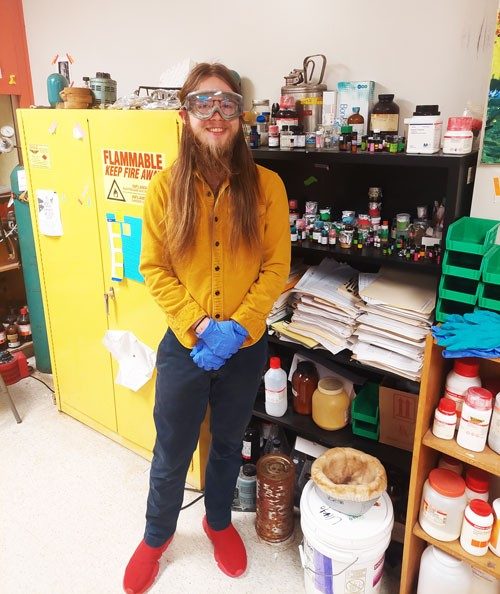
Growing your career in pharmacology at any stage
Career growth in pharmacology requires a strong network, whether you’re an undergraduate or department chair. Silva suggests building that network now by reaching out to professors and other professionals at your university, as well as graduate students at schools you might like to attend. Before applying to graduate schools, Silva connected with current graduate students over LinkedIn to learn more about their experiences in their respective programs.
Your network can also help you hone your résumé-writing skills. At the close of each internship, Silva asked a supervisor to review a blurb she wrote about the experience for her résumé. Their suggestions helped her develop a more competitive résumé for whatever application came next.
Professional development is important even for experienced professionals, says Walker of the FDA. She and her colleagues have the opportunity to attend meetings, enroll in courses, and even pursue additional degrees with FDA support.
Professional organizations like ACS and ASPET also provide many opportunities for networking and professional development. If you attend their meetings, you can drop in on pharmacology talks and learn a little about what’s going on and who is leading the research. You can also share your own findings. As an undergraduate, Heck attended an ACS meeting and presented her research on G protein–coupled receptors. The experience helped her to translate her research into a narrative that a broad range of scientists could understand—a skill, she says, that is critical for earning funding and finding jobs.
Nixon recently won an award for her poster presentation at the 2021 Annual Biomedical Research Conference for Minority Students. The interactions with other scientists boosted her confidence. In lab, Nixon regularly asks more-senior researchers questions. “It was cool to see what I knew about my research when other people were asking me questions,” she says.
Within large professional organizations, you can also join smaller groups of researchers who may share your more specific research interests. Bumpus, for example, is a member of the Analytical Chemistry, Chemical Toxicology, and Medicinal Chemistry Divisions within ACS. She also recommends that students interested in pharmacology consider joining the Biological Chemistry Division.
Many professional organizations also offer opportunities specifically for undergraduates. The ACS on Campus series, for example, helps students at universities across the country develop skills in résumé writing, networking, and interviewing. Last spring, Bumpus volunteered to speak about her career at a virtual ACS on Campus event for students at historically black colleges and universities who are considering careers in pharmacology and translational science.
There are also opportunities to connect and grow professionally within companies. Heck is a member of the Out Pfizer Employee Network, a group committed to informing Pfizer staff about issues in LGBTQ+ communities and fostering an inclusive work environment. The group holds meetings and social events, which has given Heck the chance to meet coworkers outside of her department and across career stages, from interns to executives. “Everyone gets to meet together and talk and bond,” she says.
One of the most important ways to grow in pharmacology is to actively place yourself in environments where you feel supported, says Heck. In both industry and academia, she’s surrounded herself with inclusive people who share her passion for developing drugs that can have major impacts on people’s lives. How happy you are at work can have a huge impact on your career trajectory, says Heck. “I’ve always been able to find joy in what I do.”




